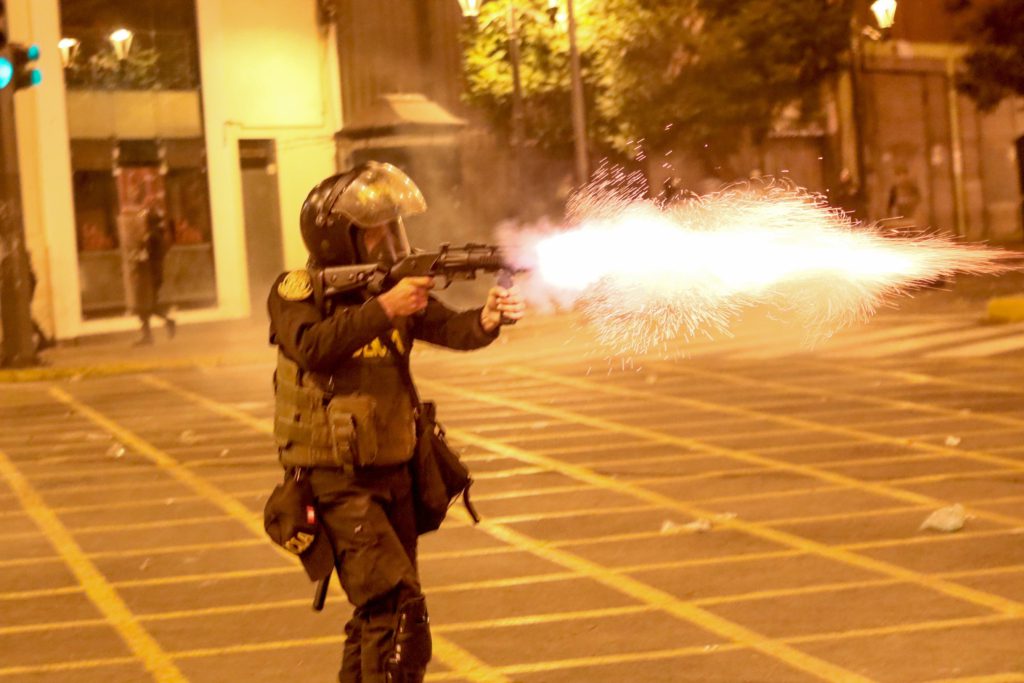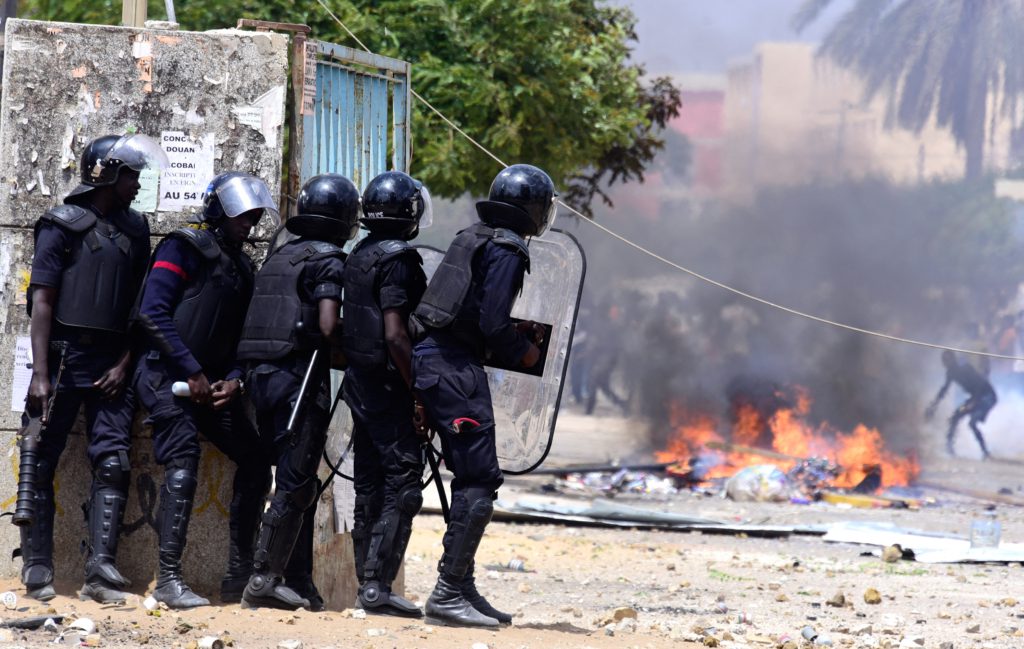Companies selling less lethal weapons to countries that abuse them to suppress protests, and states licensing these exports, are fuelling a global human rights crisis and must stop this irresponsible trade, Amnesty International said in a new investigation published today.
The Repression Trade: Investigating the Transfer of Weapons Used to Crush Dissent identifies 23 major producers of less lethal equipment and hunting ammunition whose products have been used unlawfully in protests in 25 countries worldwide. The weapons – including tear gas, rubber bullets, batons and stun grenades – have been regularly used in human rights violations, including the torture or other ill-treatment of protesters and detainees across the world.
Amnesty International used open-source techniques, weapons analysis and trade data to show how the lack of transparency and state regulation of the trade in law enforcement equipment must be urgently addressed.
It’s time that these companies fully respect all human rights wherever they operate
Patrick Wilcken, Amnesty International’s Researcher on Military, Security and Policing Issues
“In recent years, less lethal weapons have repeatedly been used to intimidate and punish protesters, causing thousands of avoidable injuries and scores of deaths worldwide,” said Patrick Wilcken, Amnesty International’s Researcher on Military, Security and Policing Issues.
“Some companies have routinely exported weapons to countries with shocking human rights records, despite reports that this equipment is being abused. The woeful lack of state regulation of the trade is enabling human rights violations and undermining the right to peaceful protest all around the world.
“The companies producing these weapons have a responsibility to put an end to their irresponsible trade in law enforcement equipment. It’s time that these companies fully respect all human rights wherever they operate.”

States that approve and license these exports are facilitating serious human rights violations, including torture and other ill-treatment, and urgently need to regulate this trade.
Amnesty International is calling on states to heed the calls of the UN Special Rapporteur on Torture and support a robust Torture-Free Trade Treaty that would prohibit inherently abusive law enforcement equipment, and introduce strict, human rights-based controls over the trade in law enforcement equipment that is often used for torture or other ill-treatment.
Reviewing protest footage from the last decade, Amnesty International found evidence of the reckless use of less lethal weapons in all regions worldwide, sometimes with deadly consequences.
Amnesty International’s flagship campaign, Protect the Protest, has exposed numerous violations of the right to protest globally. Countries across the world continue to misuse less lethal weapons such as tear gas, rubber bullets, pepper spray, and batons to harass, intimidate, punish, or drive away protesters, shutting down their right of peaceful assembly.
The trade in less lethal weapons, including crowd control equipment, is now increasingly globalized. China, South Korea, the USA and major European states dominate the market, but companies in developing economies – such as Brazil, India, and Türkiye – also produce weapons for their domestic market, and export widely.

Cheddite is a French-Italian company that produces shells and cartridges. Cheddite cartridges, which can be filled with lead shot that is used for hunting, have been used unlawfully against protesters in Iran. Verified photographs of spent Cheddite-branded shotgun shells have also appeared on social media during protests in Myanmar and Senegal that were marred by human rights violations.
Combined Systems is one of the largest producers of less lethal weapons in the USA. Amnesty International has verified images of their products in use in the USA, as well as in a series of other countries where security forces have routinely used unlawful force to crack down on protesters, including Egypt, Israel, Tunisia and Colombia.
Norinco Group is a Chinese state-owned conglomerate that manufactures a wide range of conventional weapons systems. Verified images of armoured vehicles and less lethal weapons manufactured by Norinco Group have appeared in Kenya, Venezuela, Georgia, Guinea, Bangladesh and Sri Lanka amid protest-related human rights violations.
Two South Korean companies are also featured in the investigation. Amnesty International has documented the unlawful use of DaeKwang Chemical Corporation’s tear gas and other less lethal equipment in Bahrain, Myanmar, and Sri Lanka. Amnesty International has also verified footage and obtained photos showing police using tear gas grenades exported by CNO Tech to suppress protests in Sri Lanka and Peru.
In line with the UN Guiding Principles on Business and Human Rights, companies must develop and implement human rights due diligence policies and processes that identify and address the human rights risks related to their operations and value chains.
Companies manufacturing this equipment have a responsibility to respect human rights
Patrick Wilcken
Companies exporting equipment that is at risk of being misused by police and security forces – particularly to countries with a poor record of compliance with international human rights law – must apply human rights due diligence before proceeding with any sale. If it is impossible to prevent or mitigate the potential adverse human rights impacts of the use of their products and services, then the company should suspend or cease supply in a responsible manner.
“While it is not always possible to trace precise chains for specific types of weapons, our evidence strongly indicates longstanding patterns of irresponsible trade continue to cause harm,” said Patrick Wilcken.
“Companies manufacturing this equipment have a responsibility to respect human rights and should not be exporting to countries where less lethal weapons risk being used unlawfully against protesters.
“States must support the recommendations in the UN Special Rapporteur on Torture’s report released today in New York to develop legally-binding international law to regulate this trade.”
Amnesty International contacted the companies identified above, and offered the opportunity to respond to the organization’s findings. At the time of publication, none had responded.
Amnesty International’s Protect the Protest campaign is calling on governments to send a clear message that protesters should be protected, and to remove unnecessary barriers and restrictions to peaceful protest.
Tags: Global, Human Rights, Liberty of expression.
Cuba: The State represses women human rights defenders
COP30: Pese al pisoteo de los derechos, el poder de la gente vencerá
Afghanistan: Accountability Mechanism Marks Historic Moment
Interceptación de la Global Sumud Flotilla es un acto calculado de intimidación
Israel/OPT: Bank activist Awda Al-Hathaleen demands justice and accountability
Contact Us
Regional - Américas
Calle Luz Saviñón 519, Colonia del Valle Benito Juárez, 03100. Ciudad de México, México
Global
1 Easton Street, London WC1X 0DW. Reino Unido.